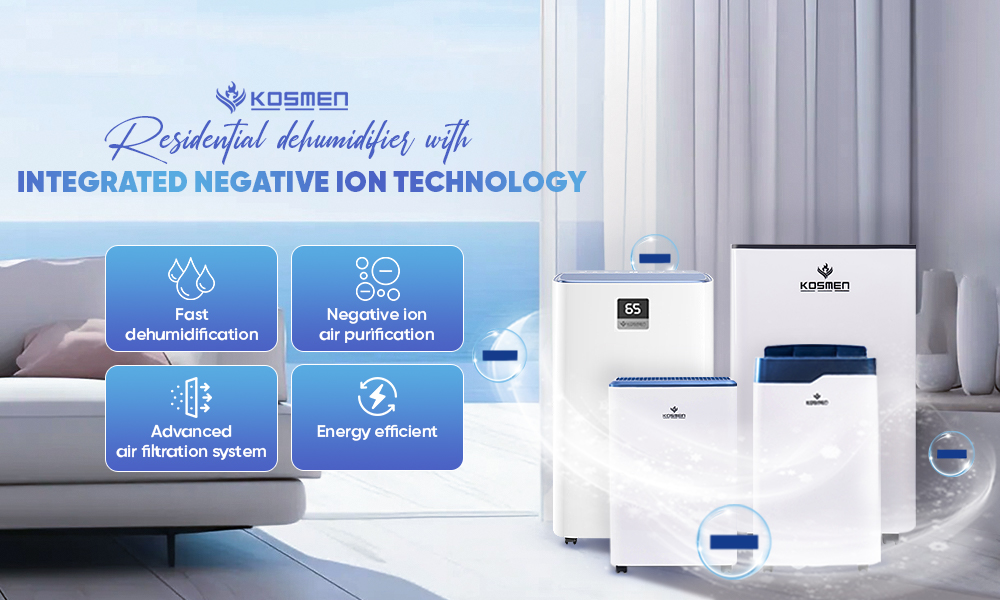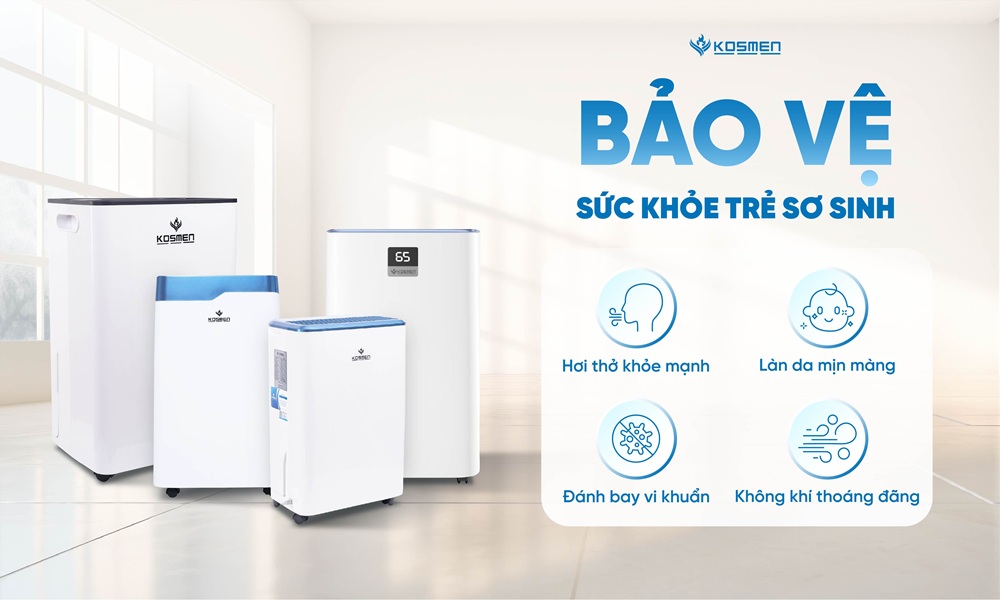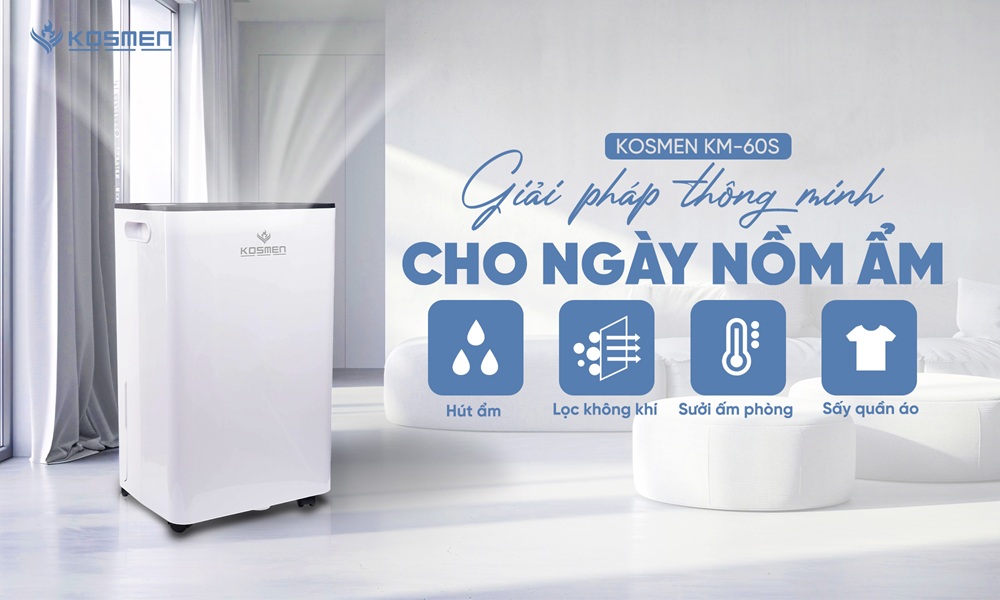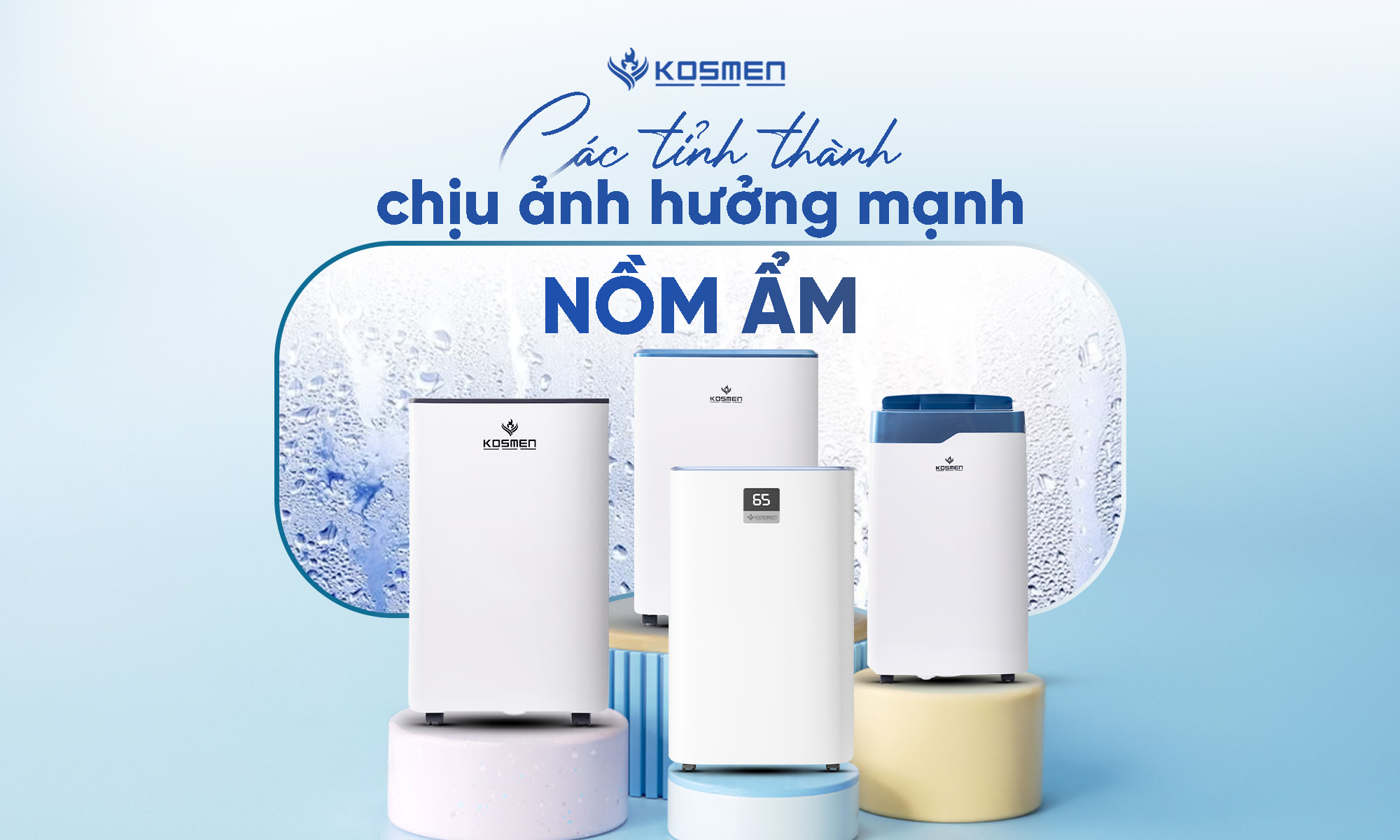Published: 12.02.2026
See moreWhat Is the Ideal Room Temperature for Newborns?
 Published:
27/03/2025, 14:00
- Updated at 25/06/2025, 14:24
Published:
27/03/2025, 14:00
- Updated at 25/06/2025, 14:24To ensure a safe and comfortable sleep for your baby, the room temperature needs to be maintained at an appropriate level. So, what is the ideal temperature? How do excessively high or low temperatures affect a child's development? How can you adjust it to help your baby sleep well and avoid health issues? Kosmen will provide detailed insights in this article!
What Is the Suitable Room Temperature for Newborns?
Maintaining an appropriate room temperature for newborns plays a crucial role in protecting their health and ensuring better sleep. According to experts, the ideal temperature for a newborn's bedroom should range between 26 - 28°C.
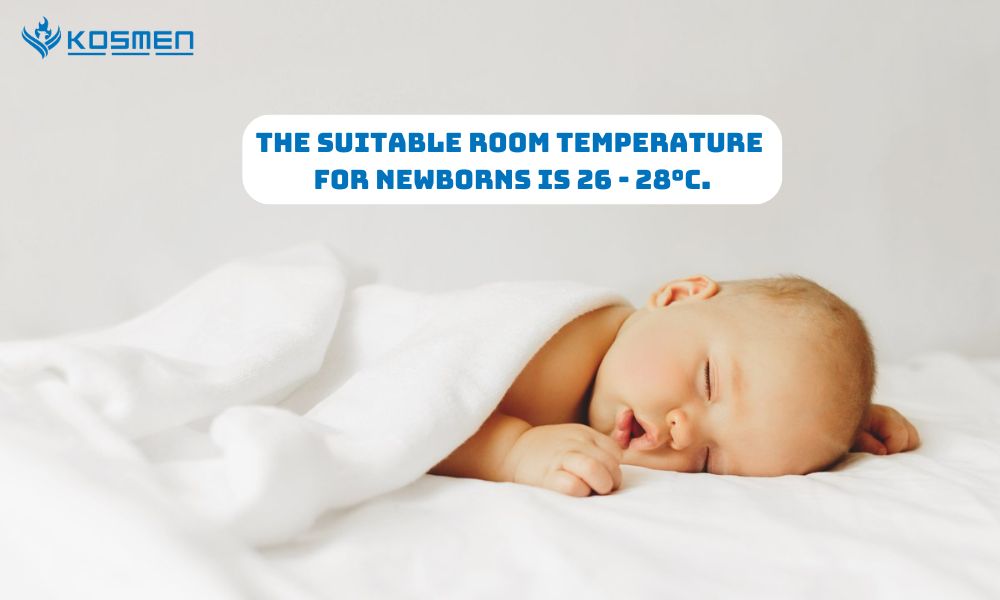 The suitable room temperature for newborns is between 26 - 28°C
The suitable room temperature for newborns is between 26 - 28°C
Because the newborn stage lasts from birth until the baby is 30 days old, their body is still very delicate and unable to regulate temperature like older children or adults. During 40 weeks of pregnancy, the baby is protected in the womb, where their body temperature is stably maintained at 37.5 - 38°C.
However, right after birth, newborns lose heat quickly if not kept warm properly. Therefore, parents should take extra care to keep their baby warm by drying them immediately after a bath, dressing them appropriately, putting on a hat, swaddling them, or practicing skin-to-skin contact with the mother to help stabilize their body temperature more effectively.
The Importance of Room Temperature for Newborns
An appropriate room temperature for newborns not only ensures their comfort but also plays a crucial role in their overall development.
When a baby sleeps in an ideal environment with a temperature between 26 - 28°C, they tend to sleep more soundly and deeply, reducing instances of startling and fussiness. Quality sleep can enhance brain development, support cognitive abilities, and improve memory retention during the early years of life.
 Enhancing memory in the early years of life
Enhancing memory in the early years of life
Additionally, maintaining a stable room temperature helps support the baby's immune system. When the baby is not exposed to excessively hot or cold temperatures, they are less likely to develop respiratory illnesses such as the flu, bronchitis, or pneumonia.
Moreover, the baby's body does not have to expend excessive energy to regulate its temperature. As a result, the calories consumed are utilized more efficiently for growth and development.
The Harmful Effects of an Unsuitable Room Temperature for Newborns
Negative Effects of a Room Temperature That Is Too High (> 28°C)
1/ Causes Dehydration and Fatigue
When the room temperature is too high, newborns sweat more to regulate their body temperature. Without timely hydration, this can lead to dehydration, causing fatigue, sluggishness, and even an increased risk of heatstroke.
2/ Increases the Risk of Heat Rash and Diaper Rash
High temperatures combined with excess sweat buildup on the baby’s skin create a breeding ground for bacteria, increasing the risk of heat rash, diaper rash, and skin irritation. These conditions can cause itchiness and discomfort, and if not treated properly, they may lead to skin infections.
3/ Disrupts Sleep and Causes Fussiness
A hot and stuffy environment makes newborns feel uncomfortable, making it difficult for them to fall asleep. Babies may toss and turn, struggle to sleep, or wake up frequently, leading to increased crying and irritability. If this persists, sleep deprivation can negatively impact their health and development.
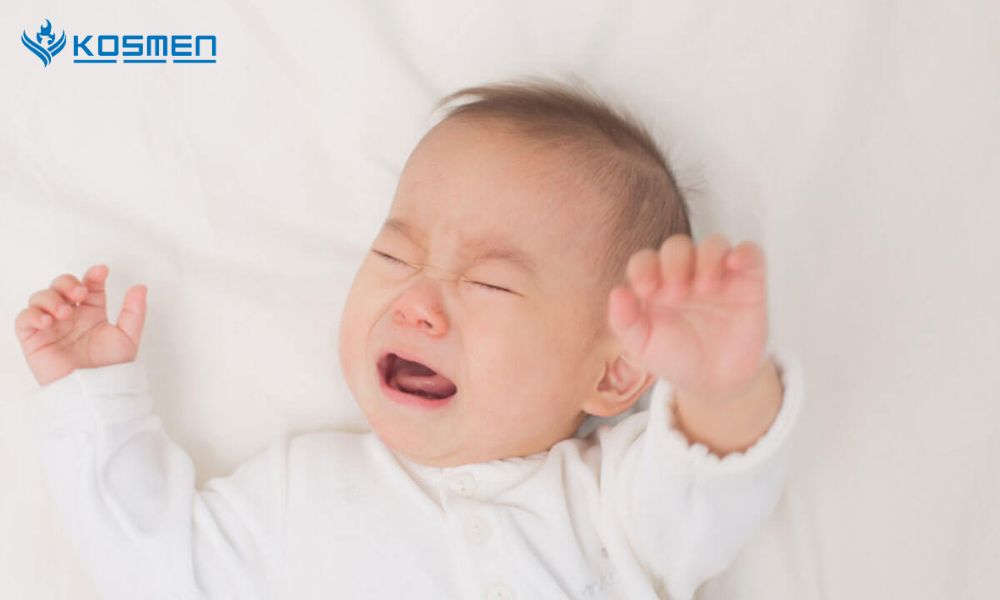 The stuffy air makes the baby feel restless and uncomfortable
The stuffy air makes the baby feel restless and uncomfortable
Negative Effects of a Room Temperature That Is Too Low (< 20°C)
1/ Increases the Risk of Colds and Respiratory Infections
When the room temperature is too cold, a baby's body must use more energy to stay warm, which weakens their immune system. This makes them more susceptible to respiratory illnesses such as colds, sore throats, bronchitis, and pneumonia.
2/ Higher Risk of Hypothermia
Newborns and young children cannot regulate their body temperature as effectively as adults. When exposed to extremely cold environments, their bodies lose heat faster than they can generate it, leading to hypothermia. Signs of hypothermia include shivering, pale or bluish skin, lethargy, weak crying, and in severe cases, it can result in respiratory distress or cardiovascular complications.
3/ Disrupts Sleep Quality
A room that is too cold can prevent babies from sleeping deeply, causing them to wake up frequently during the night. Interrupted sleep not only leads to fussiness and crying but also negatively impacts their physical and brain development.
Babies need uninterrupted deep sleep to support nervous system development and overall growth. If they are constantly cold at night, they may become irritable and fatigued during the day.
How to Check and Maintain the Right Room Temperature for Your Baby
A room thermometer is an accurate and reliable tool that helps parents monitor the surrounding temperature of their baby. To ensure the baby always feels comfortable, the ideal room temperature for infants under 2 months old is between 26 - 28°C, while for babies aged 2 to 12 months, it should be between 16 - 20°C. When using a thermometer, it should be placed away from heat sources such as heating lamps or windows to obtain the most accurate results.
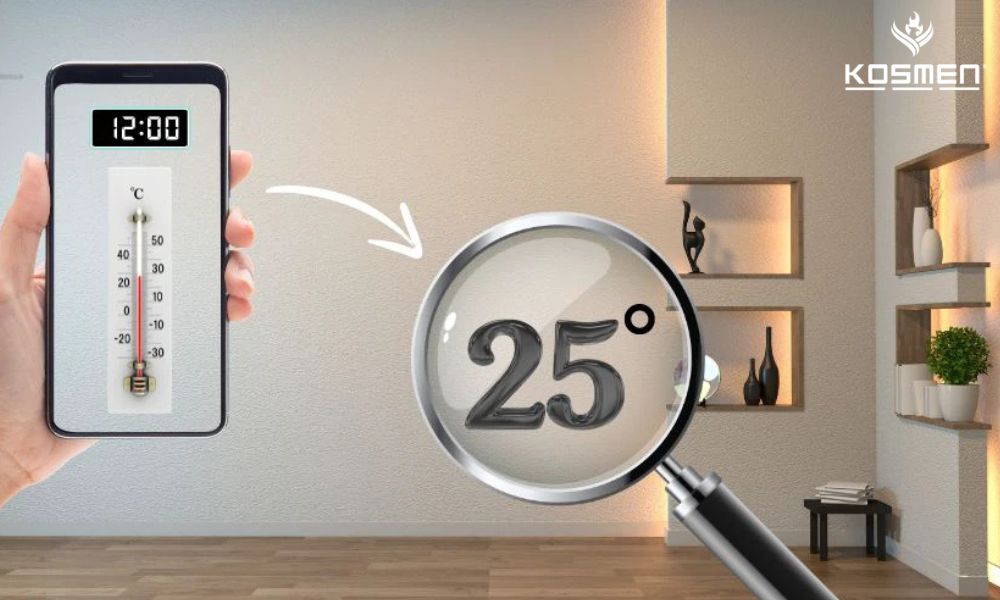 Use a thermometer to monitor the temperature
Use a thermometer to monitor the temperature
In addition to monitoring the room temperature, parents can check their baby’s body temperature by touching their hands, feet, and back.
- If the hands and feet feel cold: the baby might be too cold, and you may need to add another layer of clothing or adjust the room temperature.
- If the baby's back is sweaty: the room might be too warm, or the baby may be overdressed, so it’s best to remove a layer to avoid overheating.
- If the baby’s skin feels warm and comfortable: this indicates that the room temperature is ideal, and the baby is feeling just right.
How to Adjust Room Temperature for Newborns
How to Lower the Temperature When the Room Is Too Hot
1/ Dress Your Baby in Light, Breathable Clothing
Choosing the right clothing can help keep your baby comfortable on hot days. It is best to opt for cotton fabrics that absorb sweat well and allow for better airflow. Avoid dressing your baby in too many layers or tight-fitting clothes, as these can cause overheating. On extremely hot days, your baby may only need a light short-sleeved outfit or a thin shirt to stay cool.
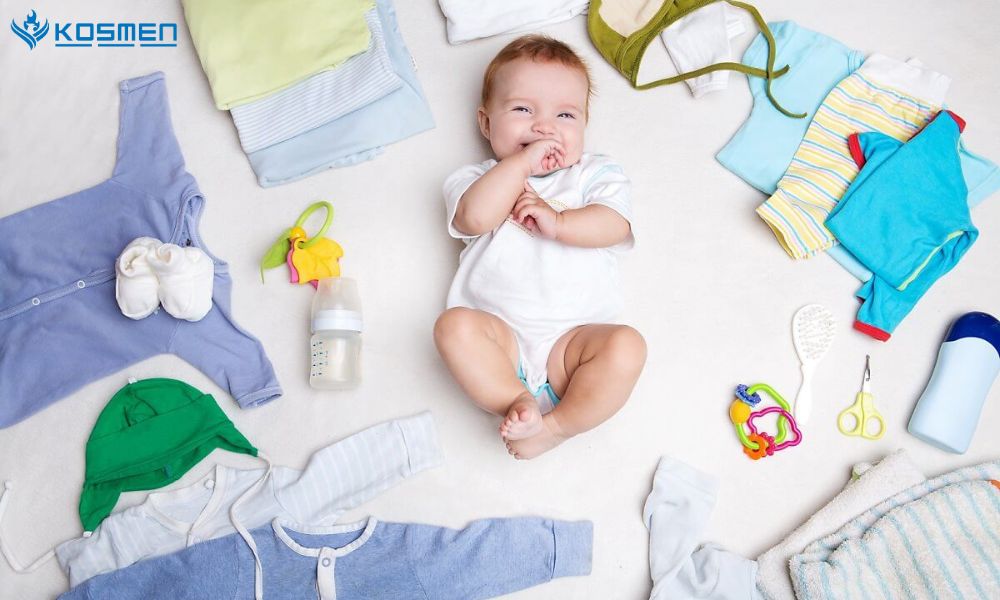 Choose appropriate clothing for the baby
Choose appropriate clothing for the baby
2/ Adjusting Air Conditioning for a Comfortable Temperature
Air conditioning is an effective way to cool the room, but it must be used correctly to protect your baby's health. The ideal room temperature for infants is 26 - 28°C. Setting the temperature too low can create a large difference between indoor and outdoor temperatures, which may lead to heat shock, colds, or respiratory issues.
3/ Using Fans Properly
If you are not using air conditioning, a fan can help circulate air and cool the room. However, it is important not to direct the fan straight at your baby, as this can cause rapid heat loss and increase the risk of colds.
Instead, set the fan to oscillate or adjust its direction away from the baby to promote airflow. If using a ceiling fan, keep it at a moderate speed to maintain a comfortable environment.
4/ Keeping the Room Well-Ventilated
Allowing fresh air to circulate helps prevent stuffiness and excessive heat buildup. Opening windows in the early morning or evening when the temperature is cooler can bring in natural air. If the weather is too hot, using curtains or blinds to block direct sunlight can significantly reduce indoor temperatures and create a more comfortable space for your baby.
How to Increase Room Temperature When It’s Too Cold
1/ Use a Sleeping Bag or a Light Blanket
For newborns, especially very young infants, using a sleeping bag is a safe and effective way to keep them warm without the risk of them kicking off the blanket during sleep. If using a blanket, choose a light, soft material and cover only up to the baby’s chest, ensuring that their face is not covered to prevent suffocation risks.
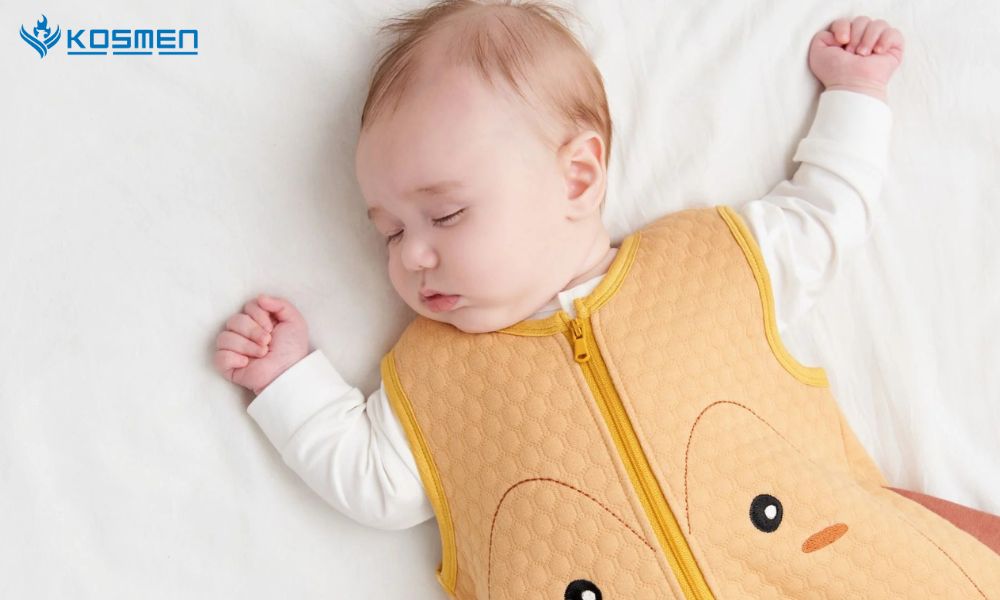 Use a sleeping bag for newborns
Use a sleeping bag for newborns
2/ Use a Heater
A heater is an effective way to raise room temperature, but it's essential to choose a model with adjustable temperature settings and a built-in humidifier to prevent the air from becoming too dry, which could affect your baby’s respiratory health.
3/ Dress in Layers
In addition to maintaining a warm room temperature, dressing your baby in layers is a great way to trap heat and keep them comfortable. Layering is more effective than wearing a single thick garment. Choose cotton or soft wool fabrics to ensure warmth without irritation. The inner layer should be made of soft, breathable fabric, the middle layer should provide insulation, and the outer layer should block cold air.
4/ Control Airflow and Keep Baby Away from Drafts
Avoid placing your baby near windows or doors where cold air can seep in. Check for gaps around windows and doors, and use curtains or draft stoppers to block cold air from entering the room. This helps maintain a stable and comfortable temperature, preventing sudden chills.
The Relationship Between Temperature and Humidity in the Air
Humidity is closely related to temperature. When the temperature decreases, the relative humidity in the air increases. This is why on cold or drizzly days, humidity levels tend to be high, often causing damp conditions, especially in northern regions. Conversely, as temperature rises, relative humidity decreases, making the air feel dry and stifling.
The ideal humidity level for a baby’s room should be maintained between 40 - 60% to minimize the risk of respiratory illnesses. If humidity is too high, the baby may feel uncomfortable, sweat excessively, and be prone to skin conditions. On the other hand, if humidity is too low, dry air can cause skin dryness, nasal irritation, and respiratory issues.
To keep both temperature and humidity at optimal levels, parents can use a humidifier when the air is too dry or a dehumidifier when humidity is too high. This helps create a more comfortable and safe environment for the baby.
A household dehumidifier is an effective device to control indoor humidity, preventing the growth of mold and bacteria, which can affect a baby’s respiratory health. With a modern design, suitable capacity, and quiet operation, Kosmen dehumidifiers provide an ideal living environment, ensuring better sleep and healthy development for your baby.
You can refer to the line of household dehumidifiers trusted by thousands of families below:
- Kosmen KM-12N household dehumidifier is a popular choice due to its practicality and durability, making it suitable for both homes and offices. During seasonal transitions, the KM-12N becomes a reliable companion, helping to maintain a dry and fresh atmosphere while effectively reducing humidity.
- For those seeking a higher-performance option, Kosmen KM-20N is an ideal solution for stable humidity control, safeguarding both health and household furniture. With its modern design and quiet operation, this model is especially favored during periods of prolonged humidity.
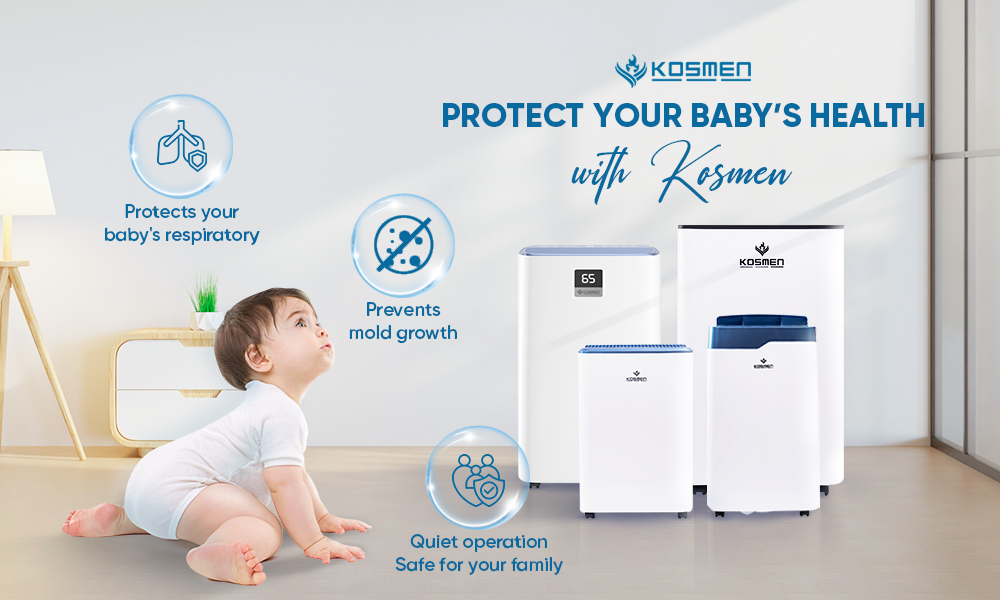 Protect your baby's health with Kosmen
Protect your baby's health with Kosmen
- Kosmen KM-30N stands out with its powerful capacity, making it suitable for various room sizes. This dehumidifier not only helps maintain a dry and comfortable environment but also prevents mold growth and protects electronic devices and wooden furniture in your home.
- For those requiring a more advanced solution, Kosmen KM-60S is an exceptional choice with superior dehumidification capabilities, making it perfect for homes, offices, and small storage spaces. Featuring a sleek design, user-friendly operation, and high durability, the KM-60S provides optimal humidity control, ensuring that your living space remains fresh and well-ventilated.
The information above helps you understand the ideal room temperature for newborns, the harmful effects of unstable temperatures, and effective solutions to regulate temperature, ensuring that your baby sleeps well and grows healthily.
We hope that with Kosmen’s insights, you have gained valuable knowledge to care for your baby in the best way possible. If you are interested in dehumidifiers to help maintain the ideal humidity level in your baby’s nursery, contact Kosmen today for detailed consultation and exclusive offers!
KOSMEN BRAND – MANUFACTURED TO GERMAN TECHNOLOGY STANDARDS
- Head Office: 27B Street 12, KP2, Hiep Binh Phuoc Ward, Thu Duc City, Ho Chi Minh City
- Hanoi Office: NV 4.7 Hai Au 2 Street, Cau Buou Urban Area, Thanh Trì District, Hanoi
- Da Nang Office: 385B Hai Phong Street, Tan Chinh Ward, Thanh Khe District, Da Nang City
- Da Lat Office: 38/7 Ba Thang Hai Alley, Ward 4, Da Lat City
- Hotline: North: 0766 899 799, South: 0888 787 959, Central Highlands: 0961 061 076
- Website: kosmen.com.vn













